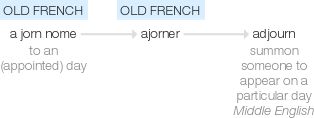Adjourn
Middle English (in the sense ‘summon someone to appear on a particular day’): from Old French ajorner, from the phrase a jorn (nome ) ‘to an (appointed) day’.
wiktionary
From Old French ajorner (French ajourner), from the phrase a jor( nomé) ("to an (appointed) day").
etymonline
adjourn (v.)
mid-14c., ajournen, "assign a day, fix a day" (for convening or reconvening of an organized body), from Old French ajorner (12c.) "meet" (at an appointed time), from the phrase à jorn "to another day, to a (stated) day," from à "to" (see ad-) + journ "day," from Latin diurnus "daily," from dies "day," from PIE root *dyeu- "to shine."
The notion is of setting a date for re-meeting. Meaning "to close a meeting" (with or without intention to reconvene) is from early 15c. Meaning "to go in a body to another place" (1640s) is colloquial. The English word has had the -d- since 16c., but the spelling is unetymological, as the compound apparently is not from Latin; Middle French also occasionally has adjourner, but this was rejected in Modern French. Related: Adjourned; adjourning.
